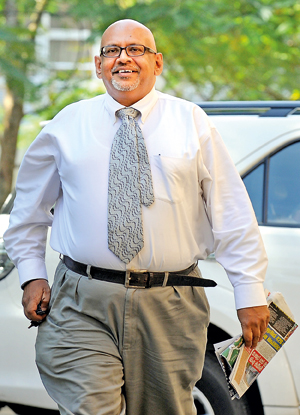SLADA desperate to eradicate doping from sports

Dr. Seevalie Jayawickrama and SLADA will be more active in 2019
Sri Lanka Anti Doping Agency (SLADA) is eyeing at doubling its quota of awareness programmes for this year, after 2018 ended with nine athletes testing positive for using banned substances, a record high in numbers. Director General of SLADA, Dr. Seevalie Jayawickrama was highly concerned on making the sportsmen and sportswomen of tomorrow more alert as to the repercussions of using banned substances or performance enhancers, which are on the banned list of World Anti Doping Agency or the WADA.
The need for making all sports free of the anti-doping menace came to light after young sprinter Chelsea Melanie, just 17 years of age, tested positive for using a banned substance at the National Sports Festival, held in Polonnaruwa in October 2018. Months earlier Sri Lanka Men’s 400m sprinter Kalinga Kumarage was tested positive and was provisionally suspended after his ‘A’ sample report, but with the ‘B’ sample too testing positive, he is likely to receive a lengthy ban.
According to statistics, the SLADA has conducted 69 awareness programmes for 2133 individuals, representing the national and development pools of all sports, athletes, coaches and Under-19 sportsmen, mainly from schools competing in the Singer Schools Rugby League Championship.
“It’s a serious concern and an alarming situation, particularly after a school-going athlete is dragged into the scene, knowingly or unknowingly. This puts us in a more questionable position, as to how these banned substances reach the youngsters, who have no clue on how to use them,” Dr. Jayawickrama told the Sunday Times.
In addition to the awareness programmes held through 2018, SLADA had conducted 276 doping tests in 17 sports and nine athletes tested positive for using banned substances. Out of the nine two each were from powerlifting, rugby, kabaddi and athletics while the other was a cyclist. In comparison with the previous year, the number shows an increase. In 2017 five athletes tested positive for using banned substance. Interestingly SLADA also conducted six tests in 2018 on horses after races conducted by the Royal Turf Club and none tested positive.
“It’s overwhelming to see two sports listed in the ‘Recognised Testing Pool’ internationally, cricket and weightlifting, stayed clean last year. It looks like these two sports have taken the anti-doping matter seriously and are taking necessary steps to keep it free from doping after the awareness programmes. I suppose others should follow their trend,” Dr. Jayawickrama emphasised.
This year, SLADA’s target reach would be schools and junior age categories of sports as it has come to light that banned substances or performance enhancement substances come through a network that is beyond the sporting circles. Youngsters, who are generally unaware of the side effects of banned substances, are targeted by the promoters, who promise quick and positive results.
“One other reason why the number of athletes who tested positive have gone up in 2018 could be the attitude of the athletes. Some are eager to lookout for shortcuts, and that’s possible through heavy commitment or using supplements. One must understand that it takes time for an athlete to reach a certain level. Supplements must be taken after referring to a doctor or a nutritionist, not on advice given by an unqualified ‘unprofessional’,” he added.
SLADA spends US $ 250 per anti-doping test and with the number of tests conducted in 2018, which is 276, Sri Lanka has spent over Rs 12 million approximately. However the expenditure and the efforts of SLADA are not reflected in the number of athletes who were caught cheating with performance enhancers.
With the alarming outcomes, and despite their tireless efforts in 2018, SLADA targets 2019 to end without any positive reports from doping tests. Dr. Jayawickrama and his team will move into a new premises with more facilities in the vicinity of the Sugathdasa Stadium in Colombo to see a more productive and comprehensive year, where the objective is to educate the younger athletes on what they could be when they age, if they use performance enhancement substances aiming at short term glory.


